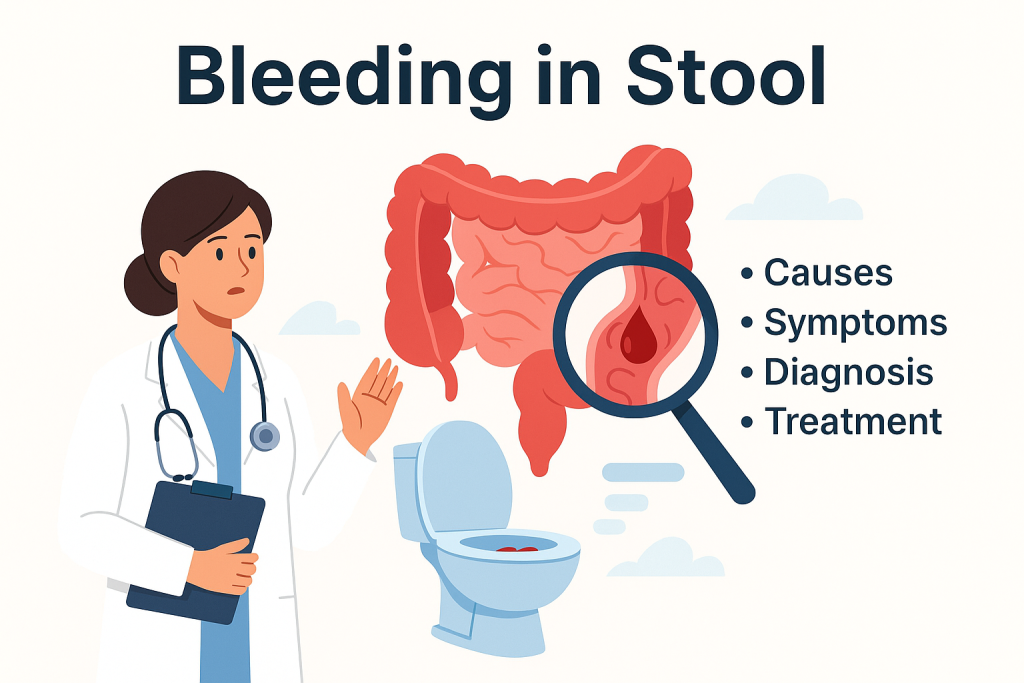Introduction: Should You Be Concerned About Blood in Your Stool?
Although finding blood in your stool can be concerning, you shouldn’t always freak out. It can occasionally be caused by something as simple as hemorrhoids. In other situations, though, it might indicate severe digestive issues or internal bleeding.
This blog will help you understand what blood in stool looks like, what causes bleeding, and when to seek medical attention.

What Does Blood in Stool Look Like?
The appearance of blood in your stool can vary, depending on the source and severity of the bleeding.
- Bleeding in the lower digestive tract (rectum or anus) is typically indicated by bright red blood.
- Blood that is dark maroon indicates that the colon is the source of the bleeding.
- Melena, or black or tarry stools, may indicate bleeding in the upper gastrointestinal tract, including the esophagus or stomach.
Blood may occasionally be completely invisible, in which case a fecal occult blood test is necessary to detect it.
What Can Cause Bleeding in Stool?
Many conditions can lead to bleeding in stool, ranging from mild to severe:
1.Hemorrhoids: Bright red blood on toilet paper or in the bowl can result from the rupture of swollen veins in the rectum or anus during bowel movements.
2. Cracks in the Anal Region:These are tiny tears in the anus’s lining that hurt and bleed a little, especially when you’re constipated.
3. Diverticulosis: Diverticula, which are tiny pouches in the colon wall, can occasionally bleed profusely. Older adults are more likely to experience this.
4. Cancer or Colorectal Polyps: Over time, polyps may bleed gradually. Some may progress to colorectal cancer if treatment is not received.
5. IBD, or Inflammatory Bowel Disease:Chronic colon inflammation and bleeding can be brought on by diseases like Crohn’s disease and ulcerative colitis.
6. Ulcers of the Peptic: Stools that are tarry or black may be the result of upper gastrointestinal bleeding.
7. Gastrointestinal Infections: Bacterial or parasitic infections can inflame the intestines and cause bloody diarrhea.
Signs of Internal Bleeding You Shouldn’t Ignore
Internal bleeding symptoms may not always include visible blood. Watch for:
- Weakness or fatigue
- Dizziness or fainting
- Paleness
- Abdominal pain or cramping
- Black, tarry stools
- Rapid heart rate
These are severe warning indicators that could point to a large amount of blood loss, potentially from a tumor, gastrointestinal perforation, or bleeding ulcer.
When to Worry About Blood in Stool
While some cases are harmless, it’s crucial to know when to worry about blood in stool:
- The bleeding is continuous or frequent.
- Additionally, you’re feeling exhausted, losing weight, or having stomach pain.
- You have tarry, dark stools.
- You have not had a colonoscopy and are over 50.
- A history of colorectal cancer runs in your family.
Blood in Stool Diagnosis: What to Expect
1. Physical Inspection: A rectal examination looks for fissures or hemorrhoids.
2. The FOBT (Fecal Occult Blood Test): This test finds blood in your stool that is hidden or occult.
3. A colonoscopy :To check for polyps, tumors, or inflammation, a thin, flexible tube equipped with a camera is placed inside your colon.
4. Endoscopy : used when there is a suspicion of upper gastrointestinal bleeding, particularly when there is blood in the vomit or black stools.
5. Imaging Examinations: To find anomalies in your intestines, you might need to have barium studies or CT scans.
Treatment for Blood in Stool
Treatment depends on the underlying cause of the bleeding:
1.Hemorrhoids/Fissures: Over-the-counter creams, sitz baths, and fiber supplements
2.Bleeding Diverticular: may stop on its own or require colonoscopic care.
3.Colorectal Cancer or Polyps: Polyp removal during colonoscopy or surgery for advanced cancers.
4.IBD: Anti-inflammatory medications, immunosuppressants, or dietary management.
5.Peptic Ulcers: Acid-reducing medications or antibiotics for H. pylori infection.
6.Infections: Depending on the cause, antibiotics or antiparasitic medications.
Prevention Tips
While medical diagnosis is essential, these tips may help reduce your risk:
- Eat a high-fiber diet to avoid constipation
- Drink plenty of water
- Avoid prolonged straining during bowel movements
- Get screened regularly for colon cancer (especially after age 45)
- Avoid overuse of NSAIDs, which can irritate your stomach lining
FAQs
Q.1 Is blood in stool always cancer?
No. It’s often due to hemorrhoids or fissures, but it’s always wise to investigate.
Q2. Can stress cause blood in stool?
Stress may worsen IBD, which could lead to bleeding, but it’s rarely a direct cause.
Q3. How is blood in stool treated?
Treatment depends on the diagnosis—it ranges from lifestyle changes to medication or surgery.
Q4. Should I go to the ER for blood in stool?
Go to the ER if you’re fainting, dizzy, or notice heavy bleeding.
Care at Colon & Digestive Health Specialists
At Colon & Digestive Health Specialists, we are committed to providing expert, compassionate care for patients experiencing bleeding in the stool. Our experienced gastroenterology team uses advanced diagnostic methods to identify the underlying cause—whether it’s hemorrhoids, polyps, ulcers, or more serious conditions—and creates a personalized treatment plan to ensure optimal recovery.
Prompt evaluation is essential when blood is present in your stool, as early diagnosis can prevent complications and improve outcomes. Don’t ignore the warning signs—schedule a consultation today and let our specialists help you restore and protect your digestive health for a healthier, worry-free future.
Dr. Karim Shakoor, M.D. is a board-certified gastroenterologist and founder of Colon & Digestive Health Specialists, LLC. He completed his residency and fellowship at Cook County Hospital, which is known for having one of the most extensive programs in the country. Karim Shakoor, M.D. is dedicated to providing his patients with the highest level of care to improve their quality of life. He specializes in the treatment of digestive disorders, including abdominal pain, colon cancer, constipation, diarrhea, diverticulitis, gas, gastrointestinal bleeding, heartburn, irritable bowel syndrome, peptic ulcers, swallowing difficulty, and ulcerative colitis.
